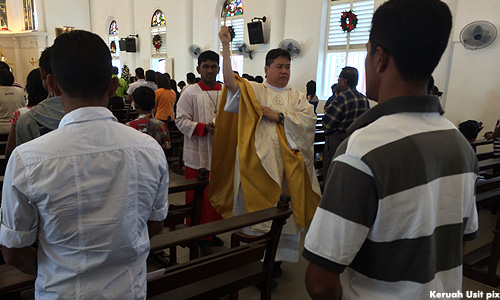This year marks the 500th anniversary of the Protestant Reformation. It was and remains one of the most momentous events in world history.
Indeed, the modern world owes a significant debt to the explosive rediscovery of the central claim of the gospel by Martin Luther, namely that one is justified by the Christian faith alone.
As a Lutheran, I am proud to claim descent to such a movement of near-apocalyptic or eschatological proportions.
There are some who say that the Reformation was a tragedy and bane for Christendom. And then, there are others who would assert that it is time to move on from the Reformation and let bygones be bygones. Many would agree that the natural and logical move should be from conflict to communion. However, there is no necessary and compelling logical connection between the two. The one does not of logical necessity lead to the other. Why?
Whilst it is critical and important not to revisit past conflicts that are grounded in mutually deep suspicion and bigotry, at the same time, it is also equally vital that continuing or persistent critical differences are not overlooked or ignored in the name of some push or quest for church unity however much needed, desirable and noble that is indeed.
Now it has to be made absolutely clear herein that the true, real and substantial differences between Catholic Christians and Lutheran Christians boils down to the one and only issue, namely that of the gospel.
All other issues are secondary and ought not to be church-dividing, if at all. That is, once the foundational, fundamental and basic issue is resolved – then the agreement on the (shape and direction of the) secondary issues can take place.
The rest are cultural expressions of the essentials of the substance of the deposit of the faith grounded in the church’s apostolic past and catholicity – which Lutherans should not baulk at accepting.

Ultimately and in the final analysis, all of the church’s theology and practice revolves around the central point that is the gospel. Without the proclamation of the gospel, there would be no church in the first place.
The church is a creature of the gospel (creatura evangelii). Already here there is disagreement with Mother Church (i.e. the Catholic Church) which she herself as the divine-human institution on earth representing Jesus Christ. The Catholic Church holds that the gospel and, by extension and inclusion, the sacred scriptures arose from within her bosom.
Such a sequence has profound impact on one’s understanding of the church’s authority, of interpretation, of the relationship between the sacred scriptures and sacred tradition and so forth. It also means that the gospel is merely one ‘criterion’ amongst others that “orient the teachings of the church to Christ” (to cite the joint declaration on the doctrine of justification).
For Luther on the other hand, the gospel can only be the basis and boundary of all of the church’s teaching, worship and practice. That one is justified by faith alone – which is the very essence of being human – ensues out of the proclamation of the gospel (in its oral and sacramental forms) and concomitantly shapes theological reflection and informs the liturgy of the church.
At the same time, understanding concerning the church’s public ministry as embodied in the ordained priesthood likewise flows out of the nature or character of the gospel as the New Testament.
Such significant differences would constitute a stumbling-block to church unity and full communion between Lutherans and Catholics. But it does not mean that the Reformation has become irrelevant. Indeed, the Reformation is more relevant than ever – simply because it is all about the gospel. Let us be clear, the Reformation was and remains and will forever be about the gospel of Jesus Christ.

Now, the grace of the gospel is not an issue between Lutherans and Catholics. Perhaps it could be said (somewhat controversially – rightfully or wrongfully) that the question about grace as understood by the two sides is a question of ‘how much grace.’
Historically and confessionally, Lutherans emphasise grace over free-will whilst Catholics tend to seek a more balanced approach otherwise known as synergism (or cooperation). The issue as has been mentioned is whether faith is alone or needs to be accompanied by obedience in constituting the divine-human relationship.
Communion between the creator and creature is based on the latter’s image and likeness of the former (imago Dei). And faith is synonymous with the imago Dei. This is because both faith (understood as a priori, i.e. given the state of total and absolute dependence prior to the exercise of the will) and the imago Dei means that one’s personhood comes from the outside of self, namely the creator. Just as the human is entirely dependent on the creator for his/ her existence in this world of the old creation, the human is likewise entirely dependent on the creator for his/ her union and communion both now and forever.
In other words, at the core of what it means to be human: To be justified by faith alone is to have the imago Dei restored – the essence of which is a total, unmerited, pure and sheer gift of God. Original sin, therefore, is rooted in the exercise of free-will to be independent of the creator, i.e. an autonomous act which resulted in the destruction of the imago Dei – at least in terms of its essence (or substance).
And of course, the imago Dei as reflecting the image of the Son is what enables humans to participate in the divine love and life of the Trinity in Themselves as union and communion of divine Persons. It is, therefore, the same divine love which unites the divine Persons that unites the humans to the Trinity.
This being the case, there can be nothing standing in-between the divine-human union and communion, e.g. free will in conformity to the law. Otherwise, it is an affront to the very character of the Trinitarian union and communion in which the Father eternally, naturally, and immediately generates the Son and spirates the Spirit without any intermediate or mediate act of the divine will. Otherwise, it would involve confusion between Person and nature, essence and energies, and the implications that the Son and Spirit are created.
This is the very gospel which Luther rediscovered as consistent with his reading of both the Old and New Testament as well as of the church fathers (both Western and Eastern).
As such, the Reformation remains relevant as ever – for since once one is liberated from bondage, one is free to then serve their neighbour both in private and public in newness of life reflecting the divine will namely that justification (one’s personal identity) is for vocation (one’s personal calling in life).
Since one justified by faith alone, there is no room for fanaticism in the spreading of the kingdom of God; and space for cooperation and collaboration in the civil arena with other Christians and Christians alike for the common good. Such a message is needed as ever in Malaysia in light of the malicious lies being levelled at the church today.
The views expressed here are those of the author/contributor and do not necessarily represent the views of Malaysiakini.

